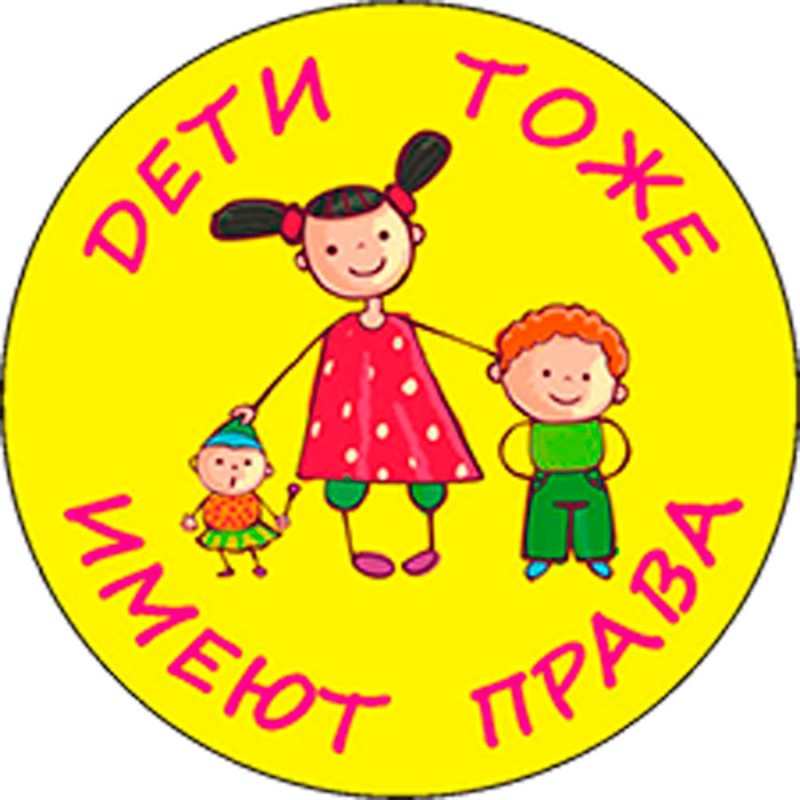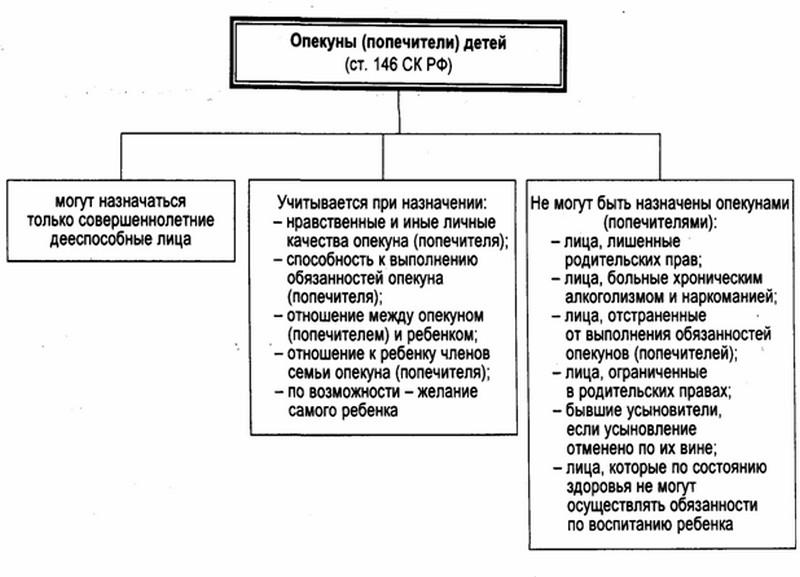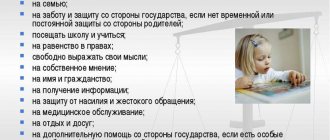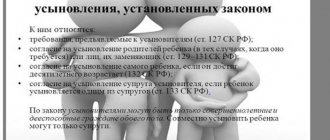List of rights of children under guardianship
Any minor over whom guardianship or trusteeship has been established has the following rights:
- to be brought up in the family of a guardian;
- receive a caring attitude towards him;
- the right to have decent conditions for living, upbringing, and education;
- the right to have his human dignity respected;
- receive the alimony payments, pension payments and other social benefits due to him;
- for the safety of residential property;
- to obtain housing;
- protect yourself from abuse by the trustee;
- communication with relatives;
- own opinion.
Next we will look at them in more detail.
The legislative framework
To know your rights and obligations, before registering guardianship, you must carefully study existing legislation. The nuances of the relationship between the guardian and the child are prescribed in Art. 31 of the Civil Code of the Russian Federation, as well as Art. 145 of the RF IC.
In paragraph 3 of Art. 146 of the RF IC details the conditions under which a person can take guardianship of a child (children). What are these conditions?
- Absence of a criminal record and non-participation of a person in court proceedings as an accused.
- No serious illnesses.
- If a person is a disabled person of group I or declared incompetent, he cannot become a guardian.
- The potential guardian must not have drug addiction or alcoholism.
- If a citizen was once deprived of parental rights or guardianship rights, he will not be entrusted with the child.
- The level of earnings and living conditions must be acceptable to support the child.
Government Decree No. 542 of May 1, 1996 prescribes diseases in the presence of which registration of guardianship is impossible.
This issue is addressed in several regulatory documents. The main one is Federal Law No. 48 “On Guardianship and Trusteeship”. Its chapters describe actions to establish guardianship procedures for minor children, the rights and obligations of the parties. Guardianship can be issued not only over children, but also over incapacitated citizens if, for health reasons, they cannot take care of themselves on their own and need outside help.
Such an action is stipulated in the Family Code and the Civil Code. Chapter 20 of the Insurance Code lists the rights and obligations of the parties involved in the issue, and Articles 31–40 of the Civil Code regulate the difficulties that arise when registering with the guardianship and trusteeship authorities (see also: list of powers of the guardianship and trusteeship authorities).
Legislation
The basis of the legislation on guardianship and trusteeship is the standards of the Civil Code of the Russian Federation. It is they, in particular, Articles 29-40 of the Civil Code of the Russian Federation, that determine the possibility and conditions for establishing guardianship, the procedure for disposing of the property of a ward, the general procedure for terminating guardianship, as well as the rights and obligations of persons caring for incapacitated wards.
In turn, family law determines the rights and obligations of guardians and trustees of minor children in Russia. In addition, the provisions of Chapter 20 of the Family Code of the Russian Federation define the conditions for the appointment of educators and requirements for them, as well as the rights of children placed in foster families.
In addition, we must not forget about the existence of the Federal Law of April 24, 2008 No. 48 “On Guardianship and Trusteeship”, which defines and specifies the powers of the guardianship authorities, the legal regime of property of wards, the responsibility and legal status of persons performing guardianship functions, including their rights and obligations, as well as the procedure for terminating relations.
At the same time, we need to remember about the resolutions of the Government of the Russian Federation dated May 18, 2009 No. 423 and November 17, 2010 No. 927, which relate to certain issues of guardianship of minors and incapacitated persons, respectively. The above-mentioned resolutions approved the “Rules for the selection, preparation and registration of candidates for the performance of guardianship functions, including the procedure for their appointment”, “Rules for the exercise of powers of guardianship authorities”, “Rules for concluding guardianship agreements”, reporting forms for guardians and other significant documents.
Education and care
A minor who is under guardianship and guardianship has every right to be raised in the family of a guardian. He also has the right to be treated with care. The guardian and ward, according to civil law, must live together. There is some exception.

Education should not contain methods that contradict moral and legal norms. Guardians should not use physical or psychological violence against their wards. Rough and cruel treatment will not be tolerated.
A caregiver should show their caring attitude, just as a parent would. Children have a certain number of life needs that need to be fulfilled. Every ward needs food, care, clothing, and help.
Special legal relationship between guardian and ward
Partially, the rights and responsibilities of guardians coincide with those of parents, but there is a significant difference:
- The relationship between guardian and ward is of an urgent nature, i.e. formally can be completed when the child reaches 14 years of age, when they are legally transformed into guardianship, as well as for other reasons;
- The guardian is accountable to the guardianship and trusteeship authority, although he has the right to independently choose the forms and methods of upbringing and education of his ward, taking into account the wishes of the child himself.
In addition, the guardian is entitled to:
- make small everyday transactions on behalf of your ward, but not to the detriment of his legitimate interests. For example, using alimony or benefits paid to a child to buy him clothes;
- legally represent it in various government bodies, public associations, banking and financial institutions;
- when exercising guardianship on a reimbursable basis, use the payments, allowances, and alimony due to the child in the interests of the ward;
- use the property of the ward only if they are endowed with such a right in the agreement on paid guardianship;
- make a decision to prevent the child from communicating with third parties, including relatives and blood parents of the ward, if such communication is harmful to the child;
- to receive all kinds of benefits that will help him fully exercise his right as a guardian. These include benefits for caring for disabled children in the form of 4 monthly paid additional days off.
The rights of a guardian in relation to the ward are closely related to his responsibilities.
Thus, the guardian is obliged:
- take comprehensive care of the child in his care, paying special attention to his health status, moral development, educational aspect;
- treat the child with mutual respect and in a manner that does not cause the ward moral humiliation and moral suffering;
- live together with their ward, or upon reaching 16 years of age, live separately, but with the consent of the guardianship and trusteeship authority;
- inform the guardianship and trusteeship authority about a change of residence;
- bear full financial responsibility for the unlawful actions of the ward;
- maintain the property of the ward until he reaches the age of 14 years;
- when independently carrying out transactions on behalf of a child, make sure that such transactions do not infringe on his legal, financial or property status;
- defend the rights and legitimate interests of the ward in case of encroachment on them by third parties.
At the request of the parents, a guardian is appointed free of charge. In this case, the parents provide funds for the maintenance of the child.
If it is necessary for a third party to manage the child’s property in the form of real estate, a bank deposit or any movable property, the guardianship authority itself concludes a trust management agreement with such a person. In this case, the guardian is responsible for the safety of the remaining property.
The guardian, as well as members of his family, are not authorized to enter into any transactions with the ward, except for transactions of donation of property by the guardian or transfer of property by the guardian for use free of charge.
The act or agreement on guardianship may separately stipulate special provisions on which the ward should be brought up, taking into account his individual characteristics of general development and needs for spiritual and moral education. For example, when placing a child under guardianship, at the request of the parents, the need to develop mathematical abilities in him, taking into account his genetic characteristics, may be indicated.
We suggest you read: What documents are needed to register a newborn child?
More from the site:
The rights and responsibilities of guardians and trustees are the same for everyone. The guardian, in fact, completely replaces the minor child’s parents and has the same responsibilities that the mother and father had if they were present. For example, raising a child is both the right and the responsibility of a guardian. Just like parents.
The guardian is obliged to educate the minor, that is, to take care of his physical, moral, spiritual and mental development. At the same time, he has the right to choose his own forms of education. Naturally, these forms must remain within the law and not violate the rights and interests of the child.
The guardian can also choose the institution in which the child will receive education and the form of the minor’s educational process. The latter is done taking into account the child’s opinion and the recommendations of the guardianship authorities. The trustee has the obligation to represent the interests of the child in the same way as the parents did, and acts on behalf of the ward without a power of attorney. If the guardian and ward decide to change their place of residence, the guardianship authorities must be notified about this.
If the ward has property, the guardian does not have the right to use it, but is obliged to properly ensure its safety. As a result, the guardian can:
- receive state-provided payments for caring for an incapacitated person;
- contact law enforcement agencies on behalf of your ward;
- demand compensation for damage that may have been caused to a citizen;
- protect the property of your ward;
- receive free medical services for your ward through a personal visit to medical institutions;
- receive additional days off monthly;
- take an additional two-week vacation annually at your own expense;
- refuse to work on weekends and holidays;
- refuse business trips if their duration involves an overnight stay in another city;
- demand a reduction in working hours.
How are guardians and trustees appointed?
Article 35 of the Civil Code of the Russian Federation describes the procedure for appointing persons caring for incapacitated people, as well as a list of citizens who do not have the right to be such.
Part 1 of Article 35 establishes that the territorial guardianship authority is obliged to identify a person capable of fulfilling the relevant obligations within one calendar month from the moment it receives information about the need to take such measures.
The appointment of a guardian is made at the place of residence of the person who needs care. In exceptional cases, guardianship may be determined according to the place of residence of the guardian.
Any appointment made by the guardianship authorities can be appealed by interested citizens in the manner prescribed by current legislation.
Part 2 indicates that guardianship can be obtained by legally capable citizens who have reached 18 years of age at the time of appointment.
The appointment of guardianship cannot be carried out in relation to:
- citizens deprived of parental rights;
- persons held accountable for crimes against life and health committed intentionally.
The appointment can only be made with the voluntary consent of an individual. When making a final decision, the guardianship authorities take into account:
- personal qualities of the person planning to care for the ward;
- availability of physical and moral abilities to properly perform duties;
- the current relationship between the guardian and the ward;
- the desire of the ward.
Guardianship and trusteeship are not assigned to citizens located in institutions that supervise the relevant category of persons. These may be educational organizations, healthcare structures, institutions for orphans and children left without care.
Education
According to the Law “On Education”, the Constitution of the Russian Federation, as well as the Convention on the Rights of the Child, general education is accessible and free for everyone. Children who are left without parental care can get an education. Municipal and state institutions provide educational services free of charge.
Important! Minors must complete at least nine grades.
The guardian must listen to the opinion of the ward when choosing an educational institution and form of education. The guardian is obliged:
- choose the form of training;
- choose an educational organization;
- protect the rights and legitimate interests of wards during training;
- participate in the management of an educational organization;
- comply with the charter of the educational institution.
Rights of guardians and trustees
The rights of this category of citizens are enshrined in Article 15 of Federal Law No. 48 “On Guardianship and Trusteeship”.
Part 1 of this article establishes a distinction between the regulation of rights by the relevant regulations:
- the general rights of guardians are determined by the Civil Code of the Russian Federation;
- The rights of guardians regarding the education and upbringing of children under the age of 18 are determined by the Family Code of the Russian Federation.
The Federal Law establishes the following rights that persons appointed as guardians have:
- protect the legal rights of wards in any situation without special permission;
- be the legal representatives of children in cases provided for by Federal Law;
- to provide assistance of a medical, legal, psychological and pedagogical nature in the provision of guardianship for an incapacitated citizen;
- demand, on the basis of a court decision, the return of the ward from illegal detention from third parties, including parents, adoptive parents or other persons;
- independently determine the methods and means of raising the ward, taking into account the opinion of the child and the guardianship authorities;
- choose the type of educational institution for the proper acquisition of knowledge by the ward, the form of education and the form of training.
The procedure for registering guardianship and the necessary documents
Of course, such a procedure has both its advantages and its significant disadvantages. The disadvantages include the fact that registering guardianship is a complex and often months-long process that requires a fair amount of patience.
In addition, full custody of a child is possible only until the age of 14, and after that the status automatically turns into guardianship. This means that when the child reaches 14 years of age, the guardian will no longer be able to conduct all affairs on his behalf.
Guardianship means that a person must live with the child, taking care of his physical and moral development.
Another disadvantage of registering guardianship is that a person is legally obliged to allow the child to meet with relatives who have maintained contact with him. In the case of adoption, such contacts with relatives can be reduced.
And yet, registration of guardianship has more advantages than disadvantages. What advantages of the procedure are we talking about?
- A person has the right to care for a child, being considered his primary representative.
- Until the age of 14, a guardian can conduct any transactions on behalf of the child.
- When completing the procedure, a person is assigned several benefits.
- Under guardianship, a person has the opportunity to determine the methods and methods of upbringing.
Of course, for a person who dreams of caring for a child and being indispensable for him, guardianship has more advantages than disadvantages. In addition, modern legislation has made sure that guardians receive considerable benefits.
Permission for guardianship and trusteeship of a minor child left without parents is issued on the basis of a resolution of the head of the local administration located at the place of residence of the child or the guardian and trustee. The latter is issued a guardianship certificate, and a personal file is opened for the ward with all relevant documents stored in the prescribed manner. Their list is given below.
Guardianship and trusteeship of minor children are permitted to capable persons who have the necessary personal qualities, taking into account the relationship between the child, the guardian and members of the guardian's family, as well as the abilities and capabilities to fulfill the assigned duties. This fact must be proven.
Based on Art. 146 of the Family Code of the Russian Federation the following categories of citizens cannot be trustees:
- deprived of parental rights;
- suspended from performing the duties of a guardian and trustee;
- having chronic alcohol or drug addiction;
- having limited parental rights;
- having the fact of cancellation of an adoption previously made for other children;
- persons who cannot fulfill the responsibilities of raising a minor child due to health reasons.
If a child left without parental care has not been taken into guardianship, he is transferred to a specialized institution for full state support. The right to dispose of property remains with him personally.
Procedure for appointing guardians
The procedure and conditions for the appointment of guardians and trustees are determined by the provisions of Art. Art. 10-11 Federal Law No. 48 dated 04/24/2008, as well as the “Rules for the selection, registration and training of citizens”, approved by resolutions of the Government of the Russian Federation dated 05/18/2009 No. 423 and No. 927 dated 11/17/2010 for children and the disabled, respectively. Despite the different regulatory documents established for different categories of wards, the procedure for registering guardianship is practically no different, except for additional requirements for the identity of the guardian.
The authority to formalize guardianship, regardless of the identity of the ward, is assigned to the guardianship authorities at the place of residence of the person requiring guardianship.
The selection and preparation of citizens can, in addition, be carried out by educational, medical, social and other institutions that are entrusted with the powers of guardianship councils, but the decision is still made by the guardianship authorities.
Taking into account all the above regulations, the procedure for appointing a guardian includes the following steps:
- Application of the candidate to the guardianship authority at the place of residence and submission of the corresponding application and package of documents.
- Conducting an inspection of living conditions by guardianship authorities to determine their compliance with sanitary standards and the requirements of the wards.
- Drawing up a report based on the survey.
- Making a final decision based on a previously drawn up act.
- Registration of the decision in the form of an act of appointment as a guardian, a conclusion on the possibility of being a guardian, or a conclusion on the refusal to appoint a guardian.
- Receipt of the act by the candidate guardian and, if necessary, challenging it.
- Further selection and acquaintance with the ward, registration of guardianship.
Please note that in general cases, only one guardian is assigned to a ward. At the same time, close relatives of a potential ward have a priority right to formalize guardianship over him over other persons who have expressed such a desire.
Conditions for establishing guardianship
Civil and family law applicable to guardianship and trusteeship establish a number of conditions under which guardianship of minors and incompetents is granted:
- mandatory consent to register guardianship on the part of the candidate;
- the age of majority and legal capacity of the candidate, his absence of a criminal record and chronic illnesses that impede the performance of guardianship functions;
- the candidate has the financial capabilities and living conditions necessary for the ward;
- availability of abilities to perform the duties of a guardian;
- taking into account the wishes of the ward, in particular, when registering guardianship of a child over 10 years old;
- the impossibility of transferring brothers and sisters to be raised by different guardians, except when it is in their interests;
- mandatory legal, pedagogical and psychological training, and so on.
Failure to comply with these conditions will result in denial of guardianship.
Honor and dignity
Children left without parental care have the right to respect for their honor and dignity. They cannot be subject to torture or violence. Harsh treatment that degrades human dignity is also unacceptable. They cannot be subjected to various medical and scientific experiments.
Harsh treatment is prohibited by the laws of our country. Physical and mental violence is unacceptable. If the trustee violates the interests of the ward, he will be held accountable. Liability may be civil, administrative or criminal in nature. If a ward believes that he is being humiliated and subjected to violence, he can complain to the guardianship and trusteeship authority.
Rights and obligations of the patron
After registration of guardianship, the patron is given a number of responsibilities:
- he acquires the status of a representative of the interests of the warded citizen in any institution;
- the guardian is responsible for the health, financial condition and well-being of the ward;
- he provides food, medical and household assistance to the ward.
Rights provided by the status of guardian:
- the guardian can dispose of the material resources of the ward;
- he can dispose of the benefits that are transferred to him according to his status;
- the patron has the right to 4 days off per month;
- Every year the guardian is granted 14 days leave without pay;
- The guardian is entitled to government payments.
All pension income, as well as alimony for the elderly ward, are credited to the guardianship account. But the patron cannot use these payments in his own interests, as well as lay claim to real estate or use it without the consent of the guardianship. All rights and obligations are stipulated in the agreement concluded between the parties.
A special body, the PLO, monitors the performance of the guardian’s duties. From time to time, guardianship officials will carry out on-site inspections. During them, the living conditions of the ward, the availability of food, the state of personal hygiene products, and compliance with the rights and obligations of the patron will be assessed.
In case of improper performance of duties, the guardian is deprived of guardianship rights. All violations are properly recorded by representatives of the guardianship authorities.
Benefits for persons providing guardianship over a minor
Financial payments are not the only assistance from the state for guardians. They are also entitled to benefits regarding payment for housing and communal services, use of public transport, etc. If there is an incapacitated child under guardianship, the benefits provided to the guardian may be expanded.
Benefits provided
A citizen who has custody of a newborn child or a child under 3 years of age can apply for maternity leave. During the process of enrolling wards at a university, such citizens can take advantage of paid leave.
If necessary, the guardian can agree with his superiors to work part-time.
We invite you to read: How to enter into an inheritance after the death of a person?
In this case, the citizen receives funds only for those hours that he worked.
Until the child becomes five years old, the guardian may refuse long-term business trips, night shifts, and overtime work.
If necessary, the state provides for the possibility of the guardian receiving a social deduction (the same applies to the standard deduction), and if the child receives an education at a university, a refund of funds spent on the purchase of stationery and textbooks, the amount of which is equal to three scholarships for the ward.
Guardians are also provided with discounts on housing and communal services, free medicines for the child (until he reaches 6 years old), and free travel around the city in public transport. What benefits a guardian of a minor child has is decided by local authorities. Therefore, additional assistance is possible in different regions.
Persons who provide custody of incapacitated children are entitled to additional assistance. What benefits are available to guardians of incapacitated children? The following rules apply to such citizens:
- If, due to the need to care for children, a citizen cannot engage in work, he has the right to compensation for wages and accrual of length of service, which is accrued on an accelerated basis.
- The guardian of an incapacitated person has the right to a shortened working day or a shortened working week.
- Such citizens can take a paid day off four times a month.
- The employer does not have the right to involve guardians in night work, work during holidays and official days off.
- The standard tax deduction is doubled. Guardians of incapacitated children do not have to pay taxes on real estate and one car.
- If necessary, the guardian can demand the provision of free special transport to deliver the child, and also receive compensation for funds spent on purchasing medications for the child.

In some cases, several guardians are assigned to the child, who are required to be equally responsible for the ward and fully protect his interests. If a situation arises when the help of only one of the guardians is needed, the others must, by mutual agreement, draw up a power of attorney for him and thereby agree to the procedure.
Payments to guardians
Guardianship can be provided on a paid or gratuitous basis.
The state offers financial assistance to persons who take care of children left without parental care.
The specific amounts of payments are determined by the constituent entities of the Russian Federation, and therefore depend on the region of residence of the guardian and the ward.
As an example, in this case, payments due to guardians in Moscow are given.
If a guardian is caring for a child who is incapacitated, he or she is entitled to additional payments. Their size is established by the state and is valid for all regions of the country.
Each month, 1,200 rubles of assistance are allocated from the state budget for an incapacitated child.
At the same time, federal programs can significantly increase the amount of funds received. In Moscow, for example, monthly payments are provided under the federal program to persons who are raising incapacitated children. Their size is twenty-five thousand rubles.
Citizens raising children left without parental supervision and assistance may qualify for more than a one-time payment and monthly transfers of funds. What is a child's guardian entitled to? First of all, such citizens are provided with a one-time benefit, which this year amounts to 16,350 rubles (including indexation).
The size of monthly payments is influenced by regional coefficients established by local authorities. In Moscow, financial assistance is as follows:
- If a child under the age of twelve is under guardianship, the guardian receives fifteen thousand rubles monthly.
- In the case of guardianship of a teenager over twelve years old - twenty thousand rubles.
Special rules apply for foster families. If, based on the results of a medical examination, the person under care was assigned the first or second health group, the amount of the benefit is 12,650 rubles, if the third, fourth or fifth - twenty-five thousand rubles. When guardianship is provided by a family with at least three children, the amount of the benefit increases by three thousand rubles (for each child).
The money received should go to meet the needs of the person under guardianship, and not be spent on the interests of the guardian. In addition to material payments, the latter also receive social benefits.
Minors can receive their due alimony and pension payments, as well as other social benefits. Parents are not exempt from paying child support. Alimony is collected from them according to the general rule and transferred to the trustee. Also, in some situations, minors are granted a pension.
A pension may be assigned due to the loss of a breadwinner. If the parents who were on duty died, the children will receive benefits. Benefits will be transferred to legal representatives. Benefits are also paid from the state. Guardians can receive benefits for children taken into the family.

Attention! All monetary payments are determined in accordance with the legislation of our country. Trustees receive payments and benefits.
Types of guardianship: joint, temporary, etc.
Now there are several types of guardianship, which also need to be understood.
For example, if the parents themselves initiated guardianship, but do not want to lose their rights, they can insist on joint custody. This option is actively practiced if parents live abroad or work on a rotational basis.
If a person alone is responsible for the baby, guardianship becomes full.
In the case when guardianship becomes only the first step on the path to adoption, it turns into temporary. Many parents prefer to first arrange guardianship, get to know the child, establishing a trusting relationship, and only then move on to adoption.
Also, Article 77 of the RF IC stipulates that if a child requires urgent care, preliminary guardianship can be issued. In this case, the procedure is simplified, and the person receives custody without collecting a whole bunch of papers.
This usually happens when the child is placed in a specialized institution for a period of no more than three months. In exceptional cases, the period may be extended to six months. In this case, the new guardian does not have the right to dispose of the ward’s property.
Preliminary guardianship can be issued when a potential guardian wishes to first assess the situation and make a decision (for more details, see the article: conditions for preliminary guardianship of a minor). To complete the procedure, a simpler package of documents is required. If desired, the guardian can subsequently formalize guardianship according to all the rules.
Implementation of guardianship or trusteeship on paid terms, payment of remuneration
Article 16 of Federal Law No. 48 “On Guardianship and Trusteeship” establishes that guardianship and trusteeship should be carried out free of charge, except in cases established by the provisions of this article and the Family Code.
However, acting in the interests of minors, the guardianship authority may draw up an agreement with the guardian on terms that require payment.
Payment of monetary reward is made through:
- income from the property of an incapacitated person;
- funds of other persons;
- Finance of the budget of the region of the Russian Federation.
In addition, citizens caring for wards have the right to petition the guardianship authorities to replace monetary remuneration with the right to exploit the ward’s property, but subject to the conscientious performance of duties. In this case, the contract specifies the structure of the property and the period of use.
If guardians and trustees do not perform their duties properly, the authorized guardianship body has the right to terminate the agreement on monetary compensation unilaterally.
Termination is also possible in cases where the guardian’s use of the ward’s property significantly affects the rights or interests of the latter.
Living space
Children have the right to retain ownership of their home. The right to use housing is also retained. A child can become the owner of a home if, for example, it was given to him or a will was written for him. He can also inherit housing by law. If a child has been placed in guardianship, this does not mean that his or her ownership rights have ceased.
We suggest you read: Who can sign orders?
Housing received through social rent is retained for the entire period of being under guardianship. If minors do not have housing, then they have the right to have it provided to them through social rent upon reaching adulthood.
If a situation occurs where an emergency occurs and children lose not only their parents but also their home, guardians can obtain certificates. These certificates allow you to purchase residential premises for the ward.
Termination of guardianship and trusteeship
Guardianship and trusteeship are terminated in the following cases:
- if the guardian (trustee) or the ward himself has died;
- if the duration of guardianship was specified, then after the expiration of this period;
- if the warded citizen is recognized as fully capable;
- upon removal or release of a guardian (trustee) from performing duties.
In addition, guardianship of minor children is terminated in the following cases:
- When a minor turns 14 years old, guardianship ends; when a minor turns 18 years old, guardianship ends;
- if a minor marries, then guardianship is terminated;
- guardianship over a child whose parents have not reached the age of 16 terminates when his parents reach the age of majority;
- if the minor is returned to his parents or adopted;
- if the ward is placed in a special institution (boarding school, medical institution, etc.).
Special legal relationship between guardian and ward
More from the site:
Special cases of establishing guardianship include the following:
- If a guardian is appointed at the request of the parents, they provide for the child in full.
- If there is a need to take action with property, the guardian must contact the guardianship service to obtain a trust management agreement.
- The guardian and members of his family cannot make transactions in relation to the ward, with the exception of the unilateral gratuitous transfer of property or its donation to the ward.
- In some cases, the guardianship agreement indicates preferences for the upbringing and maintenance of the child in accordance with the characteristics of his health, spirituality and behavior. Guardians are required to fully comply with the requirements specified in the agreement.
Main responsibilities of guardians and trustees
Article 36 of the Civil Code of the Russian Federation regulates the rights and obligations of guardians and trustees:
- conscientiously fulfill assigned obligations free of charge, except for cases expressly provided for in Article 16 of Federal Law No. 48;
- live at the same address with the persons being cared for (exception - the person has reached the age of 16 and, in the opinion of the guardianship authority, living separately will not affect the interests of the ward, nor will it negatively affect the educational aspect);
- notify the territorial guardianship authority when changing place of residence;
- take care of their wards, provide them with care and, if necessary, appropriate treatment, as well as protect their legal rights;
- be attentive to education and the upbringing of children in general.
Abuse protection

This right is one of the most important. The guardianship and trusteeship authority must protect minors who are left without parental care. The judiciary may also be involved in the defense. If a person has already reached the age of fourteen, he can independently apply to the court.
The application is the basis for protecting his interests and rights. If the ward reports abuse, an investigation will be carried out. If the fact is confirmed, the guardian may be removed from his duties. Abuse can be forced treatment, spending money that is due to the ward, etc.
Guardianship concept
According to Art. 2 of the Federal Law of April 24, 2008 No. 48 “On Guardianship and Trusteeship”, guardianship is considered a form of family arrangement for a young child left without parental care or a citizen deprived of legal capacity in court. In this case, the guardianship authorities appoint guardians to the wards, who act as their legal representatives and perform on their behalf all actions that have legal weight.
Guardianship is established by an act of the guardianship authority upon the application of a citizen who wishes to take on guardianship functions, who meets the criteria established by law and has passed all the necessary checks and preparations.
In general cases, the legislator considers guardianship as a gratuitous form of placement, but as exceptions allows for the possibility of paid (paid) guardianship - under an agreement on a foster family or foster care.
Unlike adoption, guardianship does not provide for the emergence of ties between guardians and wards, characteristic of blood relatives - guardianship and trusteeship authorities transfer children to families for their upbringing, and incapacitated ones - to protect their rights and interests.
Who cannot become a guardian?
The legal status of guardianship clearly defines the circle of persons who are prohibited from being guardians. These include:
- persons deprived of parental rights;
- convicted under articles for causing harm to health or life, sexual integrity, kidnapping, as well as under serious and especially serious articles;
- not trained to be appointed as a guardian;
- those in a same-sex marriage (see also: where are same-sex marriages officially permitted?);
- chronic alcoholics and drug addicts;
- former guardians in case of termination of guardianship.
A citizen who wishes to obtain guardianship of a minor may not meet these criteria and have the right to undergo the procedure, but if he has one of the prohibited diseases, he will be guaranteed a refusal. Such diseases include:
- pulmonary tuberculosis of groups 1 and 2;
- untreated infection;
- cancer stages 3 and 4 or stages 1 and 2 if surgery was not performed;
- mental disorders;
- disability group 1.
Communication with relatives
Despite the fact that this category of children does not live at home with relatives and parents, and is not raised by them, communication is still possible. If the parents are not deprived of parental rights, then the child can communicate with them. Communication with other relatives is also not prohibited. Guardians must ensure that their wards exercise this right. For example, helping relatives, meeting.
Important! If parents have restrictions in their parental responsibilities, then communication is possible only with the permission of the guardian, if he considers that such communication will not harm the ward and his interests.
Own opinion
Wards, just like their own children, can have their own opinions and express them. When the guardian decides any issues concerning the interests of the child, the ward can speak freely. Children can also express their opinions during the trial. Also, when resolving administrative issues, the opinion is taken into account.
If questions relate, for example, to changing initials, surnames, adoption, transfer to another family, the judicial authority and the guardianship and trusteeship authority make a decision with the consent of the person who is ten years old.
Expressing an opinion and taking an opinion into account are slightly different things. Everyone can freely express their own opinion regarding their interests, no matter how old they are. He also has the right to express his opinion in court. But this does not mean that the decision will be made based only on the child’s wishes. But taking into account opinions begins after reaching the age of ten.
If the judge wishes to listen to the child during the trial, the consent of the guardianship and trusteeship authority will be required. Also, during the interview, a teacher should be nearby. Interested parties are not allowed. The judge must clearly establish that the opinion is not complicated by influence.
Guardianship and trusteeship bodies: functions, tasks and powers
The guardianship and trusteeship body is a local executive body of a certain subject of the Russian Federation.
The main tasks that the guardianship and trusteeship body is obliged to perform are as follows:
- protection of the rights and legitimate interests of citizens under guardianship, trusteeship and patronage;
- control over the activities of guardians, trustees and assistants, as well as over organizations to which incapacitated citizens may be sent;
- supervision over the safety of the property of citizens under guardianship and trusteeship.
The guardianship and trusteeship body, within the powers assigned to it:
- identifies those people who need guardianship/trusteeship/patronage;
- carries out the procedure for establishing guardianship/trusteeship;
- conducts inspections of the activities of guardians/trustees;
- appoints (selects, trains) or removes guardians/trustees/assistants;
- gives permission to carry out transactions with the property of citizens under guardianship/trusteeship;
- checks the living conditions of the wards.









